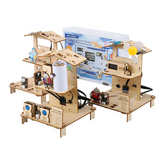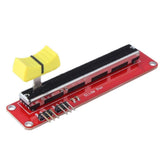-
10K Sliding Potentiometer10K Sliding Potentiometer This Sliding Adjustable Potentiometer Module 10k is an electronic slider potentiometer module that is adjustable or compatible with Arduino / Raspberry Pi for all your DIY needs. This is a sliding type potentiometer whose resistance can adjustable with the help of the...
- Rs. 113
Rs. 199- Rs. 113
- Unit price
- per
Save Rs. 86
for additional 5% discount! + Redeem RC COINS 👇















